Cloud Atlas
 for violence, language, sexuality/nudity and some drug use.
for violence, language, sexuality/nudity and some drug use.
Reviewed by: Taran Gingery
CONTRIBUTOR
| Moral Rating: | Extremely Offensive |
| Moviemaking Quality: |
|
| Primary Audience: | Adults |
| Genre: | Sci-Fi Mystery Epic Drama Adaptation |
| Length: | 2 hr. 52 min. |
| Year of Release: | 2012 |
| USA Release: |
October 26, 2012 (wide—1,950+ theaters) DVD: May 14, 2013 |
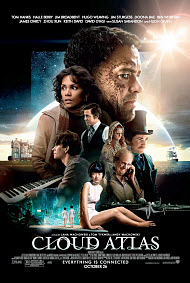

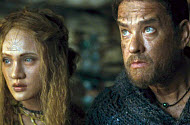
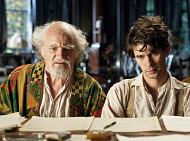
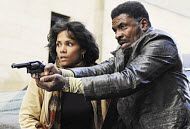
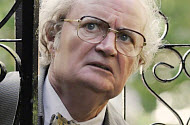

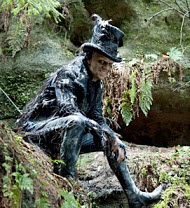
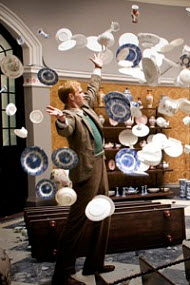
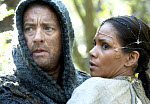
story of souls reincarnated into 6 difference times over a 500 year period
REINCARNATION—Does the Bible allow for this possibility? Answer

What is the Occult? Answer
THE OCCULT—What does the Bible say about it? Answer
the Indian belief in karma (a deed or action which causes an entire cycle of cause and effect which supposedly effects one’s future) accepted by Buddhists and Hindus / Followers of Vedanta (a school of Hindu philosophy) believe “if one sows goodness, one will reap goodness; if one sows evil, one will reap evil.”
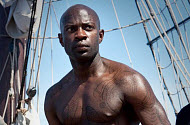
About the novel Cloud Atlas by David Mitchell
From a Biblical point of view, how do the actions of individual lives impact one another? See Galatians 6:7; Matthew 26:52; 5:38–42; Luke 6:27-31; good works
How do acts of kindness affect others and cause positive results, now and in the future?
Should I save sex for marriage? Answer
My boyfriend wants to have sex. I don’t want to lose him. What should I do? Answer
How can I deal with temptations? Answer
How far is too far? What are the guidelines for dating relationships? Answer
What are the consequences of sexual immorality? Answer
about director Lana Wachowski (formerly Larry Wachowski). He had a sex-change in 2008. For 10 years beforehand, he was having hormone “therapy.” After the sex-change, he became female Lana Wachowski. “Her” first appearance since the sex change was in an interview for “Cloud Atlas”.
GAY—What’s wrong with being gay? Answer
Homosexual behavior versus the Bible: Are people born gay? Does homosexuality harm anyone? Is it anyone’s business? Are homosexual and heterosexual relationships equally valid?
What about gays needs to change? Answer
It may not be what you think.
What does the Bible say about same sex marriages? Answer
What should be the attitude of the church toward homosexuals and homosexuality? Answer
Read stories about those who have struggled with homosexuality
How important is it to be “Politically Correct”? Answer
THE NEW TOLERANCE—It’s politically correct, but does it hold danger for followers of Christ? Is love the same thing as tolerance? Answer
SUICIDE—What does the Bible say? Answer
If a Christian commits suicide, will they go to Heaven? Answer
Is there an actual place called “Hell”? Answer
Why was Hell made? Answer
Is there anyone in Hell today? Answer
Will there literally be a burning fire in Hell? Answer
What should you be willing to do to stay out of Hell? Answer
How can a God of love send anybody to Hell? Answer
What if I don’t believe in Hell? Answer
THE GOOD NEWS—How to be saved from Hell. Answer
| Featuring |
|---|
|
Tom Hanks … Dr. Henry Goose / Hotel Manager / Isaac Sachs / Dermot Hoggins / Cavendish Look-a-Like Actor / Zachry Halle Berry … Native Woman / Jocasta Ayrs / Luisa Rey / Indian Party Guest / Ovid / Meronym Jim Broadbent … Captain Molyneux / Vyvyan Ayrs / Timothy Cavendish / Korean Musician / Prescient 2 Hugo Weaving … Haskell Moore / Tadeusz Kesselring / Bill Smoke / Nurse Noakes / Boardman Mephi / Old Georgie Jim Sturgess … Adam Ewing / Poor Hotel Guest / Megan’s Dad / Highlander / Hae-Joo Chang / Adam / Zachry Brother-in-Law Ben Whishaw … Cabin Boy / Robert Frobisher / Store Clerk / Georgette / Tribesman Susan Sarandon … Madame Horrox / Older Ursula / Yusouf Suleiman / Abbess Hugh Grant … Rev. Giles Horrox / Hotel Heavy / Lloyd Hooks / Denholme Cavendish / Seer Rhee / Kona Chief Keith David … Kupaka / Joe Napier / An-kor Apis / Prescient James D'Arcy … Young Rufus Sixsmith / Old Rufus Sixsmith / Nurse James / Archivist See all » |
| Director |
|
Tom Tykwer Andy Wachowski Lana Wachowski |
| Producer |
|
Cloud Atlas Productions X-Filme Creative Pool See all » |
| Distributor |
“Everything is connected.”
“Our lives are not our own. From womb to tomb, we are bound to others. Past and present. And by each crime, and every kindness, we birth our future.” So says Sonmi-451 (Doona Bae), a “fabricant” or genetically-modified human who is essentially a slave in New Seoul, the capital city of a futuristic dystopian Korea, where “pure-bloods” rule from on high, and the “fabricants” are mere commodities, although they are never told how worthless they are. Somni eventually joins a group of rebels who open her eyes to the truth of the abuses the “fabricants” suffer and present her with a choice—to expose the evils of the government or to do nothing with her newfound freedom.
That is only one of the six stories told in “Cloud Atlas.” Indeed, trying to sum up a movie like “Cloud Atlas” is like trying to put together a massive puzzle. Ultimately, it is six different stories following six different characters in six different time areas—and all of the stories are connected in some way. What is more, each story is decidedly different in nature, ranging from the aforementioned science fiction to absurd comedy.
A second story is that set in a post-post-apocalyptic world in which humanity has reverted back to primitive ways. Here, lowly goatherd Zachary (Tom Hanks), living with his tribe on a now barbaric Hawaii (called the Valley), is visited by a mysterious woman, Meronym (Halle Berry), who is searching for something at the top of the mountain. Zachary, at first reluctant because he believes the mountain to be the home of the Devil, agrees to be her guide on the dangerous journey after she saves the life of his daughter.
A third story is that of Adam Ewing (Jim Sturgess), in the 1800s, who is taken ill with a parasite while on board a ship on its way to San Francisco and doesn’t appear to be getting any better, in spite of the medicines of the kindly Dr. Goose (Hanks, again). While recovering, he meets a stowaway slave, Autua (David Gyasi), and the two form a friendship that eventually proves beneficial to both of them.
The fourth story is that of Luisa Rey (Halle Berry). An intrepid journalist in 1975 bent on uncovering the truth behind a report that a new nuclear power plant is dangerous. When her source is murdered, Luisa finds herself embroiled in a mystery in which friends are few and far between and yet appear and disappear unexpectedly and in which her very life may be in danger.
The fifth story is a comedy of errors in which publisher Timothy Cavendish (Jim Broadbent), through a series of unfortunate and outrageous events, finds himself tricked into committing himself to a retirement home. There, he and a band of fellow “rebel” senior citizens plot to escape their confinement.
Finally, the sixth story is that of Robert Frobisher (Ben Wishaw), an aspiring young artist who is delighted to work as an amanuensis (one who dictates another’s music) for the brilliant, but aging composer Vyvyan Ayrs (Jim Broadbent). Unfortunately, this work separates him from his lover, Rufus Sixsmith (James D'Arcy), and, what is more, his employer may have ulterior motives for keeping him there.
If each of those stories sound like enough for their own individual movies, then that is because they are. And yet, for all their complexities and differences, the stories blend well together, and the elements that connect them actually make sense. Indeed, pacing is one of this lengthy film’s lesser problems. The directors, the Wachowskis (the masterminds behind “The Matrix” trilogy and “V for Vendetta”) and Tom Tyker keep things moving at a good speed, and the screenplay and acting keep the audience invested in the stories and characters. What is more, the visuals are astounding, vast and varied, from the technological marvels of New Seoul to the sea-faring, old world set pieces of the late 1800s.
It is difficult, though, to put together the actual message of the film. One idea in the film stems from the quote at the beginning of this review, that our lives are interconnected. The part of the quote that “by every crime and every kindness, we birth our future” is strongly demonstrated in the film, especially in the stories of Zachary, Ewing, and Somni. Zachary is plagued by a memory in which he did nothing to save the life of a friend, when he could have prevented it, and later, when given a chance in a similar situation, he chooses to do the right thing and is rewarded for it.
Somni chooses to reveal the lie of the “pure-bloods” not only because they are abhorrent but because the rebels treat her with kindness and respect—in other words, like a human. Ewing shows great kindness towards the slave Autua, expecting nothing in return, and great good comes of it. Eventually, his sympathy towards Autua’s plight leads him to the abolitionist movement. When a character scoffs at his compassion, telling him that his life will amount to nothing more than a drop in the ocean, Ewing remarks, “What is an ocean but a multitude of drops?” In other words, it takes many working together to bring change.
This positive message is overcast by the film’s concept of “freedom,” which has positive connotations, but it is not always the same “freedom” that we, as Christians, think of. For example, it is mentioned that “freedom is only truly understood by those who are deprived of it” and that is true, especially in the cases of Somni and Autua, who are stripped of all freedoms granted to “humans” and as such, their pursuit of freedom is to be lauded, especially in that Somni ultimately wants freedom for others, as well.
However, one must note that theirs is a self-made freedom and is thus seen as a right, not as a gift. Theirs is a humanist’s freedom. Indeed, most of the characters seek freedom to live out their own desires, especially Frobisher, who seeks to live freely and openly with his lover, and Cavendish, who seeks to free himself from the confinements of “old age.” As one character quotes, “Boundaries are only conventions waiting to be broken”—a hedonistic view of freedom.
Furthermore, the film is muddied by a spiritualism that plays with ideas of reincarnation and a mystical, yet vague concept of an afterlife. The devil, a green-skinned whisperer of lies played with a villainous sneer by Hugo Weaving, plagues Zachary day and night, reminding him of his failures and tempting him to do unspeakable things, even kill, and yet this is also not explicitly the devil of the Bible (although he acts like him). The only inkling of Christianity is in Ewing, who is a Bible-reading, praying man and arguably, the moral strong point of the film.
The film is also definitely hindered by its content. Sexuality plays a huge part in several of the stories. Frobisher and Sixsmith share a sexual relationship (they are seen sleeping, nude from the backside) and Frobisher eventually is crudely exposed by someone else, who uses vulgar terms to describe him. We also see him in an affair with a woman which does have more blatant implications.
Cavendish recalls his young days, when he almost lost his virginity (again, we see barely veiled male and female nudity). Most graphic of all, though, is Somni’s tryst with the rebel, Chang, which is gratuitous and explicit, with frontal female nudity. Somni also witnesses a fellow “fabricant” having sex, mostly clothed, and she and many fabricants are fully nude as they dress for the day. There is foul language a-plenty—literally every obscenity and profanity one can think of is used more than once.
Violence also plays a significant part. In Luisa Rey’s world, her source is graphically shot in the head by an assassin, blood splattering the walls. That assassin shoots another woman’s dog, but the woman eventually strikes him repeatedly with a wrench, killing him. Zachary’s is a world of brutal, cannibalistic violence in which he and his tribe are frequently attacked by horse-riding savages called the Kona. One assault leaves his village burned and many people killed (we see heads on spikes). Zachary graphically cuts one Kona’s throat. A final skirmish leaves several Kona warriors dispatched in bloody fashion, while Zachary gets a cut to the face and Meronym an arrow in her leg.
Autua is whipped. Many shoot-outs and chases leave rebels and assailants killed in New Seoul. “Fabricants” who have outlived their usefulness are euthanized by a shot to the head and later hung (naked) on conveyor belts to be “recycled.” On character graphically commits suicide by shooting himself in the mouth.
Thus, in the end, “Cloud Atlas” is a mess, both in terms of content and theme. In spite of its messages about the strength of a kind act versus the equal strength of a cruel act, and the pursuit of freedom for the oppressed, its very strong violent and sexual content, as well as its convoluted spiritualism and humanistic bent mean there is little in it that warrants a recommendation for Christians. However, I will say that, as a film, it is a powerfully told, strongly acted and visually riveting mess.
Violence: Extreme / Profanity: Extreme / Sex/Nudity: Extreme
See list of Relevant Issues—questions-and-answers.


As a cautionary tale of dystopia, the plots move through the centuries from slavery (done by a group of Christian missionaries who addict the indigenous people to tobacco in order to control them) to a power company prepared to murder those who would reveal its dangerous cost cutting (and each other), to a totalitarian consumerist corporate future Korea where the clone Songmi becomes a Christ figure, and is in fact worshiped by the post apocalyptic people of the next story (even though they cannot understand what she was saying). See all »
Moral rating: Average / Moviemaking quality: 4
I felt sickened to be face to face with the worst of humanity, so effectively portrayed, but reminded that our world can be improved by the courage of individuals. Of course, we can only improve our world, but we still have that longing for eternity which this film awakens for each viewer.
Moral rating: Offensive / Moviemaking quality: 5
That brings me to the other factor of homosexuality which is also displayed in the movie numerous times. A couple other things that could be bothersome are that a witchdoctor is used for guidance, and there are about three uses of the Lord's name in vain. The movie picks up towards the middle; it is entertaining, and Tom Hanks and Halle Berry do a good job. After covering my eyes about 18 times for brief moments of about five or so seconds with the exception of few longer sex/nude/death scenes I actually enjoyed about sixty percent of the movie.
***Possible Spoiler*** There is mention of heaven and hell, and there is mention about being crucified for doing what you believe is right toward the very end.***
I don’t understand the connection between the people, and using the same actors for different roles is confusing especially, at first. Though the movie was entertaining, it is still wrapped in premarital sexual acts and homosexuality, as well as the stuff you would get in a movie with violence and language and couple other things. Just a heads up, the scene in the previews with the plates falling is surrounded by a sex scene.
Moral rating: Extremely Offensive / Moviemaking quality: 4
Moral rating: / Moviemaking quality:
Moral rating: Extremely Offensive / Moviemaking quality: 4
You might be mocking me, thinking I am a legalistic christian. Well, if your okay with watching stuff like this, then you have accepted it as “okay”. Homosexuality is a sin, and to many Christian have become so weak that they don’t want to stand against it for fear of not being seen as cool or simple offending someone. Why even call yourself a Christian if you aren’t willing to live like one? Do yourself a favor and don’t subject your mind to this sort of trash. I wish I had known that the Wachowskis brothers directed this movie before I rented it, because I wouldn’t have rented it at all if I had known. Oh excuse me, the Wachowskis siblings, one of the brothers had a sex change. They like to use their movies to promote sexual immorality.
Moral rating: Extremely Offensive / Moviemaking quality: 2
So much needless profanity was added to the film. I found myself covering the screen in several places, especially at the extremely graphic sex scene between Sonmi and Hae-Joo that had no place in a 15 rated film.
That said, the highlight for me was the representation of the Christian faith in the Pacific part of the story. However, I was still disappointed because the name of Jesus is only ever used as a swear word. I can’t deny that the film was extremely well produced (the most expensive German production ever, I think?). The music was wonderful.
Moral rating: Extremely Offensive / Moviemaking quality: 5
Also, if there was no violence in this movie, I don’t think we would have understood the whole situation, for example we wouldn’t have understood why Somni did this and how messed up the world she lived in was. I think I got offended by the fact that Sixsmith had an affair with Frobisher but then again, I almost forget that there were lovers during the movie because it seemed as if they just had a strong friendship. Also, he slept with a woman later which makes me wonder what it actually meant to him. He didn’t love her but he seemed to be interested in women. He didn’t feel only sexual desires for Sixsmith, it was—as I already mentioned—more like a strong friendship.
Yep, reincarnation is not what I believe in, but we are somehow connected, and no matter how often we could live, we’d make the same mistakes all over again. I was surprised that the movie is for adults, to be honest. The trailer didn’t seem like that to me, but there were many adults and only just a few teenagers (me included).
Moral rating: Average / Moviemaking quality: 4½
PLEASE share your observations and insights to be posted here.


I also was upset to see that someone in another user comment mentioned there being a witch-doctor in the film, when there is most certainly not. They missed much and assumed incorrectly (she was a priest).See all »
My Ratings: Moral rating: Average / Moviemaking quality: 5